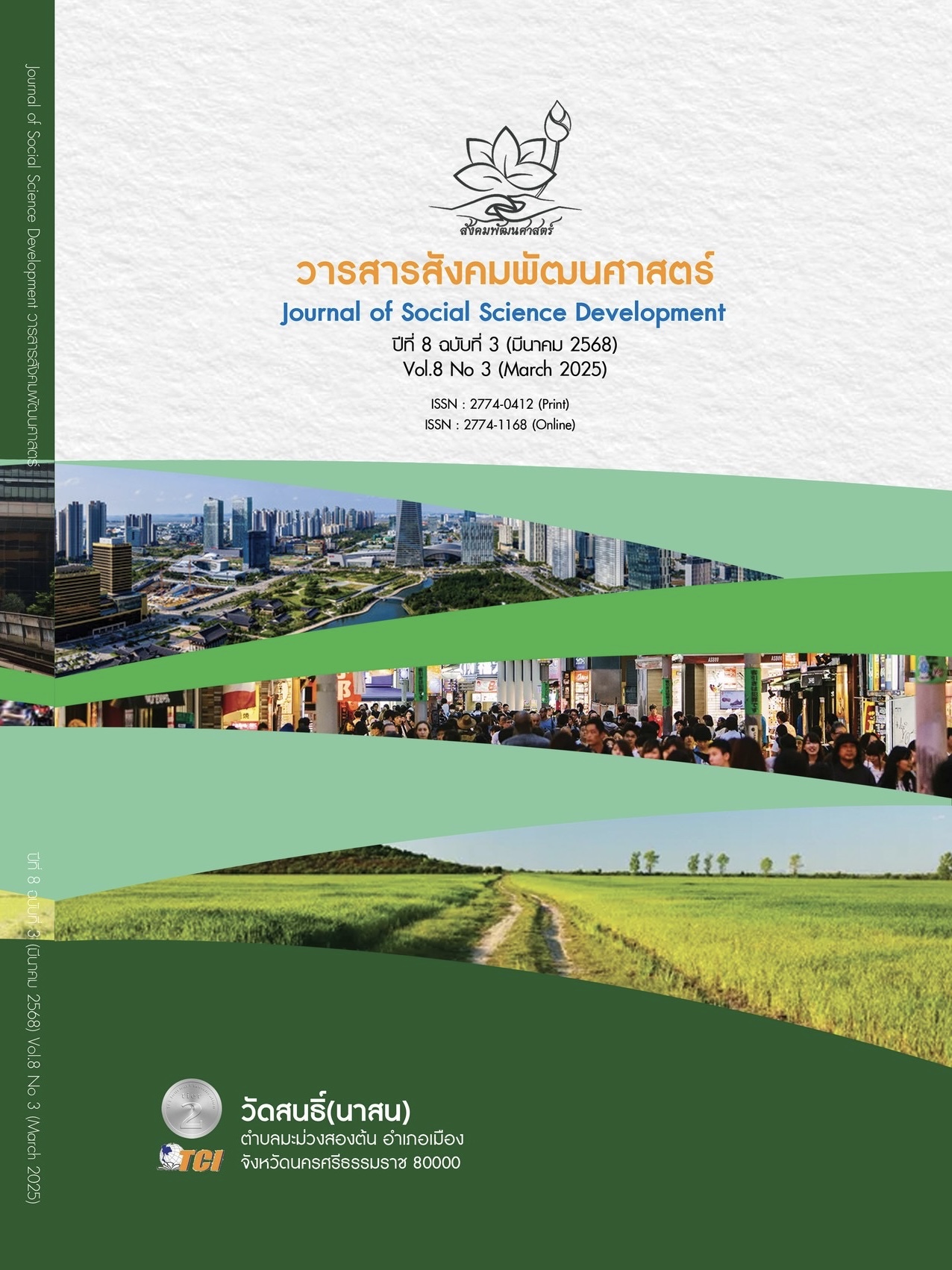A MODEL OF TEAM MANAGEMENT BASED ON THE PRINCIPLE OF APARIHARIYADHAMMA 7 IN EDUCATIONALS UNDER THE OFFICE OF SAKON NAKHON PRIMARY EDUCATIONAL SERVICE AREA 1
Main Article Content
Abstract
This research article aims to: 1) study the needs for team management in educational institutions, 2) develop a team management model based on the 7 principles of Aphirakhaniyatham, 3) test the use of the team management model based on the 7 principles of Aphirakhaniyatham, and 4) evaluate the team management model based on the 7 principles of Aphirakhaniyatham in educational institutions under the jurisdiction of the Office of the Primary Education Service Area, Sakon Nakhon Province, District 1. The research follows a mixed - method approach with quantitative research. The sample group consists of 327 teachers selected using the Krejcie and Morgan sample size table. The research instrument is a questionnaire with a 5 - point Likert scale. The statistical methods used are mean, standard deviation, and data analysis through the analysis of the needs. The results of the study are as follows: 1) The needs for team management in educational institutions, in terms of the current situation, overall, are at a moderate level ( = 3.65, S.D. = 0.373), while the potential situation, overall, shows a high level (
= 4.66, S.D. = 0.466). 2) The evaluation of the team management model based on the 7 principles of Aphirakhaniyatham reveals that, overall, it is at a high level. When considering the individual aspects, the usefulness aspect is rated as very good (μ = 4.16, σ = 0.473), the feasibility aspect is rated as high (μ = 4.40, σ = 0.645), and the appropriateness aspect is rated as moderate (μ = 3.68, σ = 0.627). 3) The test results of using the team management model based on the 7 principles of Aphirakhaniyatham show that, overall, it is at a high level (μ = 4.44, σ = 0.325). 4) The evaluation results of the model showed that the content validity index (CVI) of the assessment items was 1.00 for the entire version.
Article Details

This work is licensed under a Creative Commons Attribution-NonCommercial-NoDerivatives 4.0 International License.
References
กระทรวงศึกษาธิการ. (2562). หลักสูตรแกนกลางการศึกษาขั้นพื้นฐาน พุทธศักราช 2551. กรุงเทพมหานคร: โรงพิมพ์ชุมนุมสหกรณ์การเกษตรแห่งประเทศไทย.
คณะกรรมการการศึกษาขั้นพื้นฐาน. (2560). การขับเคลื่อนการศึกษามัธยมศึกษาไทย 4.0 เพื่อการมีงานทำแห่งศตวรรษที่ 21. กรุงเทพมหานคร: โรงพิมพ์ชุมนุมสหกรณ์การเกษตรแห่งประเทศไทย.
จรวย บุญสาลี และคณะ. (2567). การประยุกต์ใช้หลักอปริหานิยธรรมของผู้บริหารกับการบริหารงานบุคคลในโรงเรียนตามแนวคิดเห็นของครูสังกัดเทศบาลเมืองปากพนัง อำเภอปากพนัง จังหวัดนครศรีธรรมราช. วารสารศึกษาศาสตร์ มมร, 12(1), 56-67.
ธรรมธัช แมดมิ่งเหง้า และคณะ. (2566). การประยุกต์ใช้หลักอปริหานิยธรรมในการบริหารสถานศึกษา. วารสารมณีเชษฐาราม วัดจอมมณี, 6(1), 65-80.
ธีระ รุญเจริญ. (2553). ความเป็นมืออาชีพในการจัดและบริหารการศึกษา ยุคปฏิรูปการศึกษา. กรุงเทพมหานคร: ข้าวฟ่าง.
นารีรัตน์ บำบัดทุกข์ และคณะ. (2567). ภาวะผู้นําการเปลี่ยนแปลงยุคบานี่ที่ส่งผลต่อประสิทธิภาพการทํางานเป็นทีมของครู สังกัดสํานักงานเขตพื้นที่การศึกษาประถมศึกษาจันทบุรี เขต 2. วารสารมหาจุฬานาครทรรศน์, 11(10), 251-261.
นิภาวรรณ เจริญลักษณ์ และคณะ. (2566). พระสงฆ์กับการส่งเสริมคุณภาพชีวิตเด็กเยาวชนกลุ่มเปราะบาง: ประสบการณ์การพัฒนาชุมชนวัดใหม่สี่หมื่น อำเภอดำเนินสะดวก จังหวัดราชบุรี. วารสารมนุษยศาสตร์และสังคมศาสตร์ มหาวิทยาลัยมหาสารคาม, 42(6), 933-947.
บุญชม ศรีสะอาด. (2556). วิธีการทางสถิติสำหรับการวิจัย เล่ม 1. (พิมพ์ครั้งที่ 5). กรุงเทพมหานคร: สุวีริยาสาส์น.
พระครูโอภาสสราธิคุณ โหมดศิริ และคณะ. (2565). การเมืองการปกครองตามหลักอปริหานิยธรรมในพระพุทธศาสนา. วารสาร มจร พุทธโสธรปริทรรศน์, 2(2), 148-160.
พระธีรเดช ธีรเตโช. (2561). การปฏิบัติงานตามหลักอปริหานิยธรรมของบุคลากรเทศบาลในเขตเมือง จังหวัดสงขลา. วารสารปรัชญาปริทรรศน์, 23(2), 109-116.
เริงวิชญ์ นิลโคตร และคณะ. (2567). ความเป็นทีม: บุพนิมิตของการเป็นองค์กรแห่งการเรียนรู้วิถีพุทธ. วารสารวิจัยนวัตกรรมการศึกษาและเทคโนโลยี, 2(1), 50-60.
สำนักงานเลขาธิการสภาการศึกษา. (2560). แผนการศึกษาแห่งชาติ พ.ศ. 2560 - 2579. กรุงเทพมหานคร: บริษัท พริกหวานกราฟฟิค จำกัด.
Berg, G. A. (2015). Collaborative leadership in education: An interdisciplinary perspective. New York: Routledge.
Cronbach, L. J. (1990). Essentials of Psychological Testing. (5th ed.). New York: Harper Collins.
Hargreaves, A. & Fink, D. (2006). Sustainable leadership. California: Jossey-Bass.
Hargreaves, A. & Fullan, M. (2012). Professional capital: Transforming teaching in every school. New York: Teachers College Press.
Hargreaves, A. (2016). Professional capital: Transforming teaching in every school. New York: Teachers College Press.
Katzenbach, J. R. & Smith, D. K. (1993). The wisdom of teams: Creating the high-performance organization. Boston, MA: Harvard Business Press.
Krejcie, R. V. & Morgan, D. W. (1970). Determining Sample Size for Research Activities. Educational and Psychological Measurement, 30(3), 607-610.
Leithwood, K. & Jantzi, D. (2005). A review of research on school leadership effects. The Elementary School Journal, 106(2), 207-230.
Likert, R. (1993). A Technique for the Measurement of Attitude. Chicago: Rand Mc Nally.
Lunenburg, F. C. (2011). Power and leadership: An influence process. International Journal of Management, Business, and Administration, 14(1), 1-9.
Northouse, P. G. (2018). Leadership: Theory and practice. (8th ed.). Thousand Oaks: Sage publications.
Robinson, S. P. & Judge, T. A. (2019). Organizational behavior. (18th ed.). New Jersey: Pearson.
Sallis, E. (2014). Total quality management in education. London: Routledge.
Yukl, G. A. (2010). Leadership in organizations. (7th ed.). Bangkok: Pearson Education.


